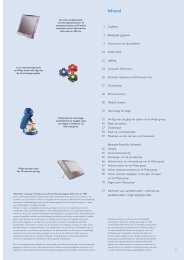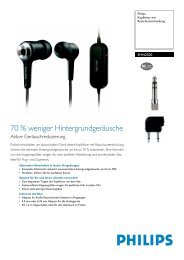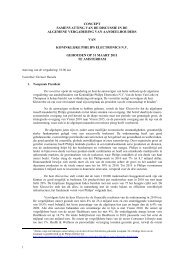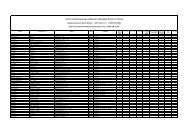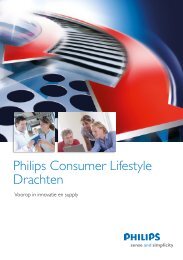Philips not recession-proof after all
Philips not recession-proof after all
Philips not recession-proof after all
Create successful ePaper yourself
Turn your PDF publications into a flip-book with our unique Google optimized e-Paper software.
<strong>Philips</strong> <strong>not</strong> <strong>recession</strong>-<strong>proof</strong> <strong>after</strong> <strong>all</strong><br />
Dear <strong>Philips</strong> shareholder,<br />
<strong>Philips</strong> consists of three distinctly different divisions that each require a tot<strong>all</strong>y different<br />
approach. The Healthcare division (medical systems) performed reasonably well in 2008, but<br />
Consumer Lifestyle in particular (television sets, audio systems, shavers and domestic<br />
appliances) proved to be weak. Clearly the transformation process focusing on ‘health and<br />
well being’ that CEO Gerard Kleisterlee initiated has <strong>not</strong> been completed yet.<br />
Vision 2010 targets abandoned<br />
In December 2008 the electronics concern was forced to announce that the targets formulated<br />
in their Vision 2010 strategy were aimed too high. So this meant a profit warning. <strong>Philips</strong> is<br />
being hit hard by the <strong>recession</strong> on virtu<strong>all</strong>y <strong>all</strong> fronts. An operating result before amortisation<br />
(EBITA) of over 10 percent from 2010 is no longer realistic. To illustrate this: in 2008 an<br />
EBITA margin of just 3.5 % was realised - in 2007 this was 7.7 %. For the period 2008 to<br />
2010 <strong>Philips</strong> will <strong>not</strong> be able to realise a comparable average annual turnover growth of 6<br />
percent. For the same period their long term targets for the separate divisions will also be<br />
abandoned, without clarifying when they should be met.<br />
Two divisions showing signs of weakness<br />
Final quarter figures for 2008 almost read like a disaster scenario. <strong>Philips</strong>’ quarterly turnover<br />
dropped from EUR 8.4 to 7.6 billion. EBITA arrived at EUR 141 million, in sharp contrast<br />
with the EUR 871 million it reached in the same quarter a year earlier. The net result was well<br />
over EUR - 1.5 billion. In 2007 this was EUR 1.4 billion. The Consumer Lifestyle and<br />
Lighting divisions in particular have been hit hard by the economic downturn. <strong>Philips</strong> expects<br />
Consumer Lifestyle to shrink considerably in 2009 so that Healthcare may become their<br />
largest division. The medical division is now a bright spot, with turnover growth rising by 9<br />
percent to EUR 2.6 billion and with an EBITA of 14.2 percent. But here, too, prospects are<br />
gloomy, because, for example, hospitals will have fewer investment opportunities. For the<br />
Lighting division, which <strong>Philips</strong> expanded by acquiring Genlyte and Lumileds at the top of<br />
the market for well over EUR 2 billion, the effect of the crisis in the construction industry and<br />
the automotive sector will only show in this year’s figures. So it looks like the worst is yet to<br />
come.<br />
Without any major changes consumer electronics will remain <strong>Philips</strong>’ problem child, which,<br />
because of its low valuation, keeps inhibiting expansion opportunities for the other divisions.<br />
In order to make the electronics concern less cyclic<strong>all</strong>y sensitive, the VEB is of the opinion
that divesting this <strong>not</strong>orious loss making activity should at least be considered. The VEB<br />
would like <strong>Philips</strong> to clarify how they are going to weather the storm in the short term in these<br />
ch<strong>all</strong>enging market circumstances and how they propose to develop their growth strategy.<br />
Performing worse than peers<br />
<strong>Philips</strong> compares itself with a group of eleven international competitors, including Electrolux,<br />
Siemens and General Electric. This comparison reveals a gloomy picture. Based on the 2008<br />
total shareholder return (TSR) <strong>Philips</strong> is lagging behind despite a major shares acquisition<br />
programme of well over EUR 3.3. billion. Only General Electric is performing worse, mainly<br />
because their financial branch is in some difficulty. In the long term, TSR has <strong>not</strong> been very<br />
impressive, either. When Gerard Kleisterlee took up the position of CEO in 2001 <strong>Philips</strong> was<br />
quoted at circa EUR 35 Euros but this rate has now dropped to EUR 13.<br />
Poor to average performance generously rewarded<br />
Last year the shareholders´ meeting voted against the proposed remuneration plan. That is<br />
why for 2009 <strong>Philips</strong> is introducing an adjusted long term remuneration scheme for their<br />
shares and options. The VEB concludes that <strong>Philips</strong>’ position hasn’t evolved in a positive<br />
way, however. <strong>Philips</strong> keeps generously rewarding a below average performance, when in a<br />
situation like this a bonus is <strong>not</strong> appropriate at <strong>all</strong>. If, for instance, <strong>Philips</strong> is ranked seventh<br />
(as regards stock market results and dividend) within a group of twelve competitors, then<br />
board members will still get 80 % of shares. Meanwhile the maximum share bonus is<br />
significantly increased from 120 % to 200 %. On the other hand, if <strong>Philips</strong> hits rock bottom no<br />
shares will be <strong>all</strong>ocated at <strong>all</strong>. The VEB also strongly objects to the free <strong>all</strong>ocation of shares:<br />
if board members still own shares three years <strong>after</strong> <strong>all</strong>ocation, they will get a bonus share for<br />
every five shares.<br />
As to the proposed options scheme the VEB would like to point out that even if <strong>Philips</strong><br />
performs re<strong>all</strong>y poorly (the lower 25 % of the peer group) 80% of the options will still be paid<br />
to their board members. This means a bonus is guaranteed without achieving anything. In<br />
view of the low achievement threshold for the shares programme and for the options scheme<br />
in particular, the VEB advises shareholders to vote against the new long term remuneration<br />
plan.<br />
On behalf of the Vereniging van Effectenbezitters (Dutch Investors’ Association )<br />
Jan Maarten Slagter, managing director<br />
In case you would like to respond to this letter, please send an email to info@veb.net<br />
Note: When this letter was drawn up the annual figures for 2008, the annual report and the agenda for the shareholders’<br />
meeting had <strong>not</strong> been available as yet



